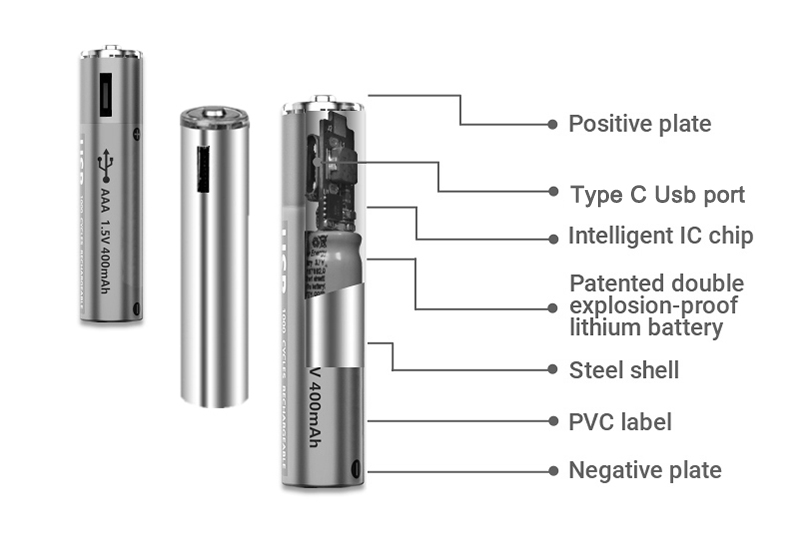Battery Knowledge
-

What Factors Affect the Shelf Life of Alkaline Batteries?
Alkaline batteries typically last between 5 to 10 years, depending on various factors. I find it fascinating how alkaline batteries can be stored for up to 10 years, provided they are kept under the right conditions. Understanding what influences the longevity of alkaline batteries ...Read more -

How Do USB-C Rechargeable Batteries Work in High-Drain Devices
USB-C rechargeable batteries revolutionize how I power high-drain devices. Their unique charging capabilities bring both convenience and efficiency to my daily tech interactions. As I explore their operation, I realize that understanding these batteries is crucial for optimizing performan...Read more -

Why do alkaline batteries leak, and how can I prevent it?
Causes of Alkaline Battery Leakage Expired Alkaline Batteries Expired alkaline batteries pose a significant risk for leakage. As these batteries age, their internal chemistry changes, leading to the generation of hydrogen gas. This gas builds up pressure inside the battery, which can even...Read more -

Can You Trust Alkaline Batteries Under Heavy Discharge Conditions
Alkaline battery capacity changes significantly with drain rate. This variability can impact device performance, especially in high-drain applications. Many users rely on alkaline batteries for their gadgets, making it essential to understand how these batteries perform under different co...Read more -

Are batteries affected by temperature?
I have seen firsthand how temperature changes can affect a battery’s lifespan. In cooler climates, batteries often last longer. In hot or extreme hot regions, batteries degrade much faster. The chart below shows how battery life expectancy drops as temperatures rise: Key Point: Temperatu...Read more -

Is an alkaline battery the same as a regular battery?
When I compare an Alkaline Battery to a regular carbon-zinc battery, I see clear differences in chemical composition. Alkaline batteries use manganese dioxide and potassium hydroxide, while carbon-zinc batteries rely on a carbon rod and ammonium chloride. This results in longer lif...Read more -
Which is better lithium or alkaline batteries?
When I choose between lithium and alkaline batteries, I focus on how each type performs in real-world devices. I often see alkaline battery options in remote controls, toys, flashlights, and alarm clocks because they offer reliable power and cost savings for everyday use. Lithium batteries, on t...Read more -
How Does Alkaline Battery Technology Support Sustainability and Power Needs?
I see the alkaline battery as a staple in daily life, powering countless devices reliably. Market share numbers highlight its popularity, with the United States reaching 80% and the United Kingdom at 60% in 2011. As I weigh environmental concerns, I recognize that choosing batteries impac...Read more -
Which Battery Performs Best for Your Needs: Alkaline, Lithium, or Zinc Carbon?
Why Do Battery Types Matter for Everyday Use? I rely on the Alkaline Battery for most household devices because it balances cost and performance. Lithium batteries provide unmatched lifespan and power, especially in demanding situations. Zinc carbon batteries suit low-power needs and budget cons...Read more -
AA Battery Types and Their Everyday Uses Explained
AA Batteries power a wide range of devices, from clocks to cameras. Each battery type—alkaline, lithium, and rechargeable NiMH—offers unique strengths. Choosing the correct battery type improves device performance and extends lifespan. Recent studies highlight several key points: Matching batt...Read more -
Safe and Smart Methods for AAA Battery Storage and Disposal
Safe storage of AAA Batteries starts with a cool, dry location away from direct sunlight. Users should never mix old and new batteries, as this practice prevents leaks and device damage. Storing batteries out of reach of children and pets reduces the risk of accidental ingestion or injury. Prop...Read more -
Simple Steps to Keep Your D Batteries Working Longer
Proper care of D batteries delivers longer use, saves money, and reduces waste. Users should select suitable batteries, store them in optimal conditions, and follow best practices. These habits help prevent device damage. Smart battery management keeps devices running smoothly and supports a c...Read more




